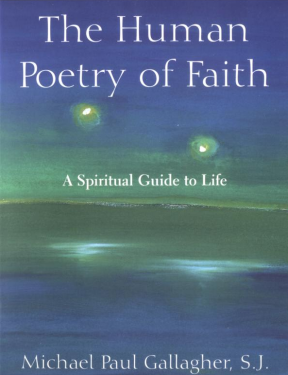This is the seventh column in a series
 FATHER MICHAEL Paul Gallagher, S.J., gives the third chapter of his book “The Human Poetry of Faith: A Spiritual Guide to Life” (New York: Paulist Press, 2001, pp. 142), a title that I found provocative. He calls it “Struggles and Shadows.” In reading the title, I had the feeling that the chapter might have a special message for me. It did. At the beginning of the chapter, Father Gallagher writes the following:
FATHER MICHAEL Paul Gallagher, S.J., gives the third chapter of his book “The Human Poetry of Faith: A Spiritual Guide to Life” (New York: Paulist Press, 2001, pp. 142), a title that I found provocative. He calls it “Struggles and Shadows.” In reading the title, I had the feeling that the chapter might have a special message for me. It did. At the beginning of the chapter, Father Gallagher writes the following:
“This chapter looks at an area of experience that we are shy about. We carry hurts and guilts of so many kinds – usually wrapped in silence. And yet owning of our vulnerability is not only a way to spiritual transparency, as the wisdom of all religions testify. It is also a crucial step towards gentler aliveness as human beings together. Many imaginative writers have the courage to force us to enter these self-wounded zones.” (p. 30)
Earlier today, I received the sacrament of reconciliation. I am wondering if this is one reason why Father Gallagher’s insight into the importance of facing our wounds, hurts and sensitivities, especially facing them with others, has such a special meaning for me. Has the sacrament helped me to face my vulnerability? Has admitting to my confessor that I feel wounded? What about when I reflect on my age, fearful of the future? I think it has and this is one reason why this chapter in Father Gallagher’s wonderful book speaks so directly to my experience of my self and others.
Perhaps without awareness of what power they have, others can heal us and help us to face with courage and faith our finitude, frailty and fragility. Father Gallagher refers to a sermon that John Henry Newman gave when he was an Anglican minister. Newman said that our avoidance and concealment of our hidden hurts was the reason why our religious beliefs remain so unreal.
Bound in Special Union
We each have wounds and we conceal them thinking that letting them be known would distance us from people, whereas the truth is that the revelation would bind us in a special union. All of our talk of salvation and redemption has no depth if we don’t face our need for salvation and redemption. Father Gallagher writes the following:
“Newman saw this fear of facing our shadows as the root of our shallowness. Because ‘we dare not trust each other with the secret of our hearts’ – our sense of failure and resultant vulnerability – ‘our love is not enlarged and ‘our religion, viewed as a social system, is hollow.’ The title Newman gave to his sermon was ‘Christian Sympathy,’ with the implication that if God embraces all human woundedness in Christ, we too are invited into a surprising lowering of our defences.
“That text is extraordinary for its time. It talks about a possibility of staying on the surface both of life and of faith. This fear leaves us unable to trust anyone with the dim corners that lurk in every life. These unvoiced burdens, according to Newman, leave us unfree to live fully. And those silences, even when shared, create hollowness within what passes for religion.” (pp. 33-34)
I don’t think that Father Gallagher is encouraging us to wear our hearts on our sleeves. Nor is he suggesting that we experience immediate intimacy with others. I think that what he is urging is that we should be able to open ourselves to those whom we think of as close to us.
Immediately, I think of my confessor and spiritual adviser with whom I have been sharing secrets for 40 years and also some of my close friends. When I do share my woundedness with them, I feel renewed. Their goodness, love and faith plays a very strong role in my life. My experience with them is that I feel like I am receiving special gifts, that they are precious gifts in my life.
I have been in a discussion group for several years and one member is a non-Catholic. More than once he has asked me what we Catholics mean by salvation. Right now I cannot recall what my responses were to that question but having read Father Gallagher, I think I will be able to make the Catholic idea of salvation a little more clear.
There are many ways to try to articulate the mystery of salvation. One way is that God loves us – warts and all! That love changes everything and gives meaning to every aspect of life. That love frees us to face our failures and believe we are forgiven, to face what is most unattractive about ourselves – perhaps our worst secrets. That love enables us to believe that God’s love can heal us and that God will wipe every tear from our eyes.
Father Robert Lauder, philosophy professor at St. John’s University, Jamaica, is the author of “Pope Francis’ Spirituality and Our Story” (Resurrection Press).
